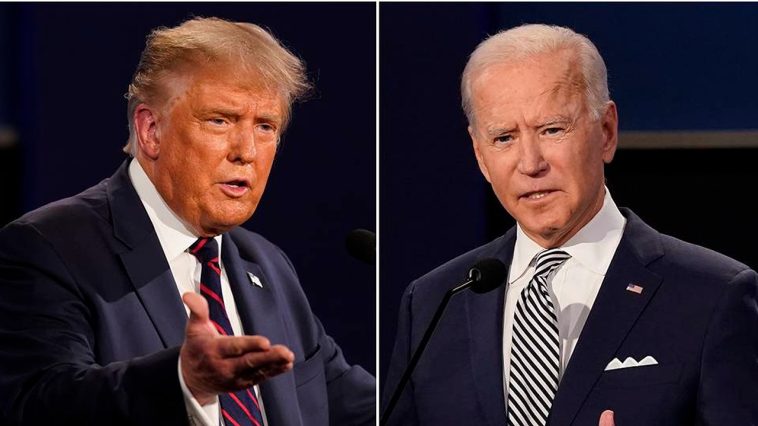LISTEN HERE:
Recent polling data indicates a significant decline in support from minority voters for President Joe Biden, while support for former President Donald Trump has experienced a notable increase. The Monmouth University Poll reveals that Biden’s approval among black, Latino, and Asian voters has dropped from 63% in July to 47%.
In contrast, Trump’s support within these communities has risen from 23% to 33% over the same time period. It is worth noting that during the 2020 presidential election, Biden garnered the support of over 70% of nonwhite voters, as reported by The New York Times.
Concerns are growing among Democratic Party officials that Biden’s diminishing support from minority voters may jeopardize their chances of winning the 2024 election, as highlighted in The Wall Street Journal.
The poll also discovered that 76% of respondents perceive Biden as “too old,” a sentiment similar to what was observed in a previous WSJ poll conducted in September. Interestingly, despite being only three years younger than Biden, only 48% of voters believe Trump is similarly advanced in age.
The Monmouth poll, conducted via telephone between September 19 and September 24, surveyed 814 American adults, with the question results pertaining to 737 registered voters.
It is important to acknowledge that all such polls carry a margin of error, in this case, 4.5%. These latest findings emphasize the evolving dynamics surrounding support for the two prominent political figures.
The data suggests that some voters who previously supported Biden may now be shifting their allegiance towards Trump.
This change could be attributed to various factors, such as policy decisions, messaging strategies, or perceptions of leadership. It is vital for both parties to analyze and respond to these shifting trends within the electorate.
While the findings reveal a decline in minority support for Biden, it is important not to focus on stereotyping or generalizing the demographic.
Instead, it is crucial to respect the diversity of opinions within the conservative community. Engaging in thoughtful dialogue and understanding the concerns and perspectives of all voters can contribute to a more inclusive and representative political landscape.
As the political landscape continues to evolve, it is necessary for candidates to consider how they can appeal to a broad range of voters and address their specific concerns. The shifting demographics and preferences within the electorate demand adaptability and an open-minded approach.
The recent decline in Biden’s support among minority voters serves as a reminder that candidates must continually earn the trust and confidence of all voters, regardless of their cultural or ethnic backgrounds.
By presenting compelling policies and effectively conveying their vision for the nation’s future, candidates can forge connections with voters across the political spectrum.
To ensure the success of any political campaign, it is imperative for candidates to acknowledge the concerns raised by voters and work towards comprehensive and inclusive solutions.
By genuinely listening to the electorate and incorporating their ideas and perspectives into their platforms, leaders can build trust and encourage active participation in the democratic process.
An analysis of the shifting support within the electorate suggests that voters are attentive to the leadership qualities exhibited by candidates.
This awareness of leadership is not limited to one specific demographic but resonates across the political spectrum. Building trust, demonstrating integrity, and showcasing a clear vision for the future are crucial elements for any candidate seeking widespread appeal.
While it is essential for politicians to address the concerns of conservative voters, it is equally important to acknowledge that their perspectives do not encompass the entirety of conservative thought.
Each individual within this diverse demographic possesses their own unique experiences, opinions, and priorities. By recognizing and embracing this diversity, political leaders can foster a more positive and constructive dialogue.
The shift in support from Biden to Trump among minority voters highlights the need for continuous efforts to engage and understand the ever-evolving electorate.
By adapting strategies and policies to align with voters’ changing concerns, political candidates can ensure they remain relevant and connected to a wide range of constituents.
It is essential to consider the broader context within which these shifts in support occur. Multiple factors can influence the preferences of voters, including the current socio-economic climate, global events, and public sentiment.
A nuanced understanding of these dynamics offers valuable insights into the evolving landscape of political support.
As candidates strive to appeal to a wide range of voters, they should avoid relying solely on demographic assumptions or predictions. Instead, it is essential to engage with voters on an individual level, addressing their specific concerns and demonstrating a commitment to meaningful progress for all Americans.
In conclusion, recent polling data indicates a decline in support for President Joe Biden among minority voters, while support for former President Donald Trump has experienced a notable increase.
These findings emphasize the importance of understanding and addressing the concerns of all voters, regardless of their cultural or ethnic backgrounds. By actively engaging with the electorate and presenting compelling policies, political leaders can ensure they remain representative and effective in a diverse political landscape.
The shifting dynamics of political support necessitate an adaptable and inclusive approach from candidates. By recognizing the diverse opinions and concerns of voters across the political spectrum, leaders can foster an environment of open dialogue and constructive engagement.
The polling data provides an important glimpse into the changing attitudes and preferences of the electorate. It underscores the necessity for political candidates to continually assess and respond to these nuanced shifts in support. By doing so, candidates can effectively connect with voters and build a stronger, more inclusive democracy.
While it is critical to analyze and respond to changes in support among voters, it is equally important to avoid generalizations or stereotypes. Each voter brings their own unique perspective and considerations to the table. By respecting and valuing the diversity of opinions within the electorate, leaders can foster a more inclusive and united nation.



